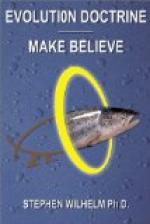It is true that even at the present time some biologists are reluctant to accept the thoroughgoing mechanical interpretation of organic phenomena, partly because these are so complex that their ultimate constituents cannot be discerned, but more often on account of the apparently purposeful nature of biological processes. Some, indeed, have gone so far as to postulate something like consciousness which controls and directs the formation of protoplasm, and the exercise of its distinctive properties in the way of growth, reproduction, and embryonic development into the adapted adult. But the fact remains that wherever analysis has been possible the constituent elements of an organic process prove to be physical and chemical. Protoplasm differs from inorganic materials only in its complexity and in the properties which seem to owe their existence to this complexity. As Huxley points out, it is no more justifiable to postulate the existence of a vitalistic principle in protoplasm than it would be to set up an “aquosity” to account for the properties of water, or a “saltness” for the qualities of a certain combination of sodium and chlorine. We may not know how the elements produce the properties of the compound, but we do know that such properties are the invariable products of their respective constituents in combination. As far as the evidence goes, it tells strongly and invariably in favor of the mechanistic interpretation.
Under the present limitations, it is impossible to give this subject the further discussion it deserves. It is not our purpose to review the origin of life in times past, and the origin of living matter from inorganic constituents, though the subject is one of the most important in the field of cosmic evolution. We must begin with the living organism; and how the first one arose must be of less importance to us than the knowledge of its mechanical constitution and of its mechanical operation. Of far greater value is the realization that a living creature is not an independent thing, but that, on the contrary, it must hold the closest possible relations with the world of materials and energies constituting its environment. We must again insist upon the importance of that mechanical adjustment to the conditions of life which is the universal characteristic of plants and animals. It is the history of these creatures and the origin of their adapted conditions that we are called upon to study. We must scrutinize the nature of to-day to see if we can find evidence that evolution is true, and if we can discern the forces which, acting upon the living mechanism as man has dealt with machines, might bring the various species of the present day to their modern forms.
* * * * *




